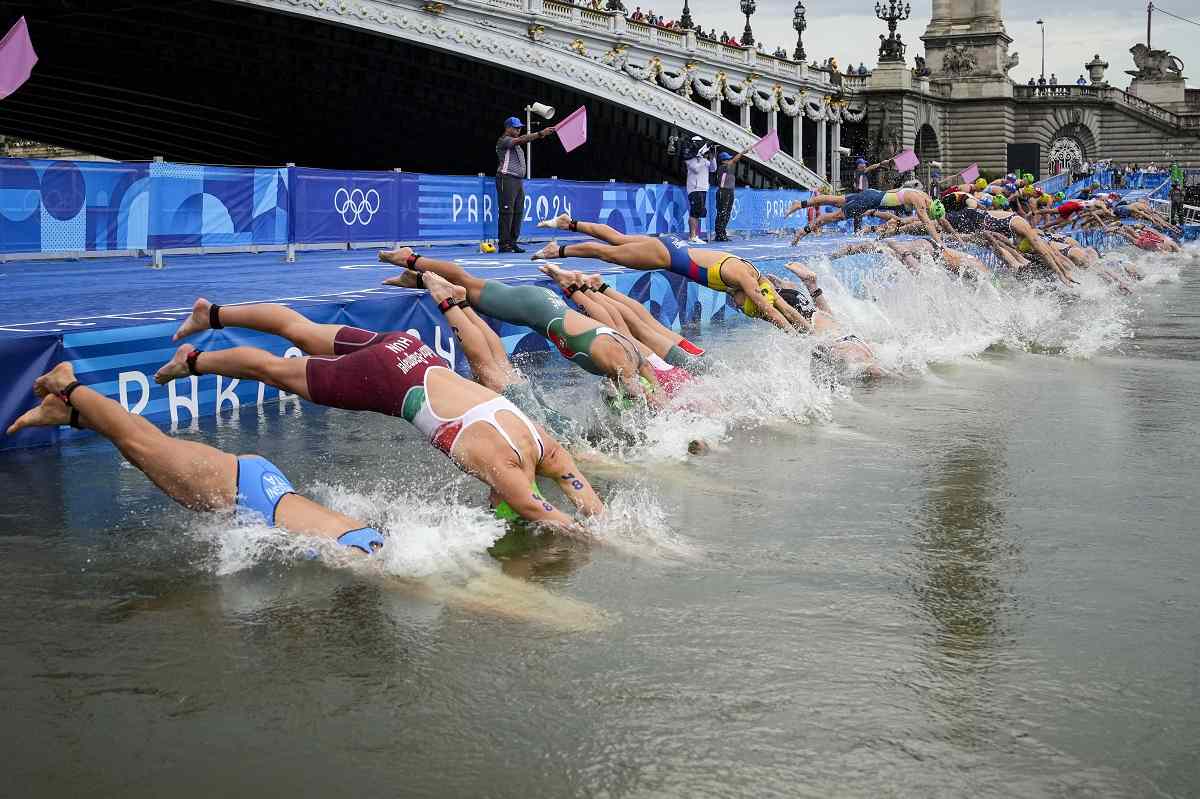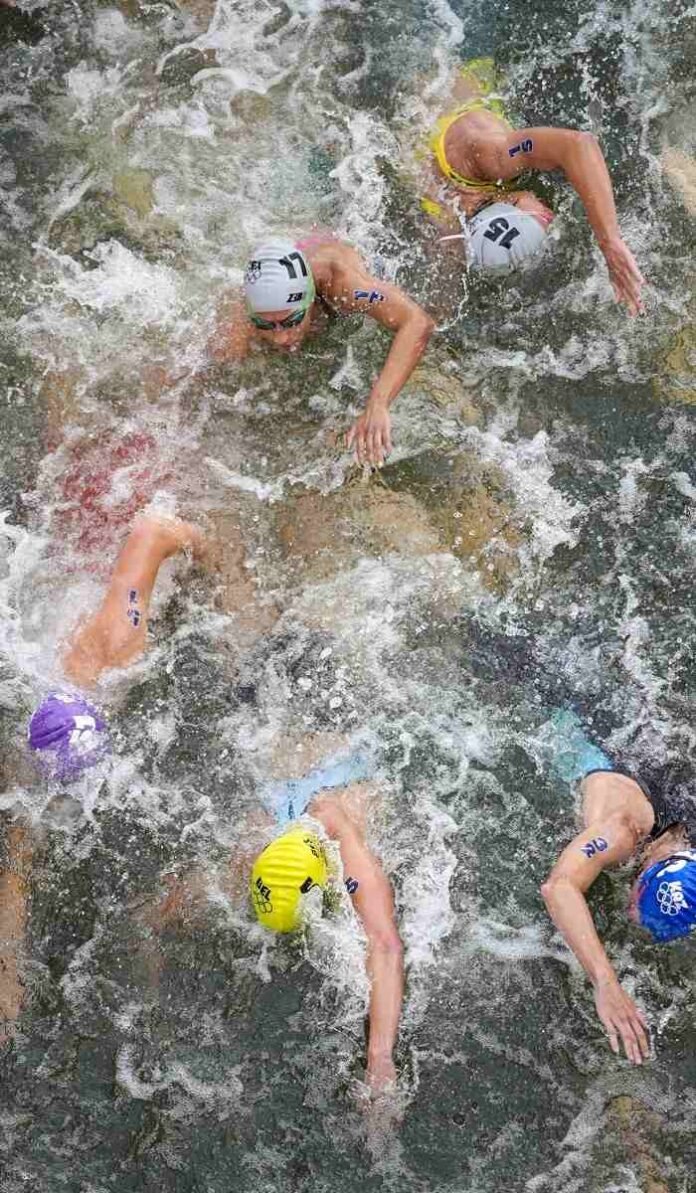Mexico’s Rosa Maria Tapia Vidal (17) and Australia’s Natalie Van Coevorden (15) will compete in the swimming portion of the women’s individual triathlon at the 2024 Summer Olympics on Wednesday, July 31, 2024 in Paris, France.
17:38 JST, August 1, 2024
PARIS (AP) — Olympic triathletes took a dip in the Seine River on Wednesday after organizers declared the water in Paris safe for swimming following days of concerns about elevated bacteria levels caused by last week’s heavy rains.

Athletes dive into the water for the start of the women’s individual triathlon during the 2024 Summer Olympics, Wednesday, July 31, 2024, in Paris, France.
The women jumped into the river at the majestic Pont Alexandre III around 8am, with the rain gradually easing as the athletes splashed into the water. Some dunked their goggles in the Seine before donning them and diving into the river with the Eiffel Tower in the background. The men followed suit a little less than three hours later.
The decision to go ahead with the swimming for the triathlon competitions was a big deal for the city, the Olympic organizers and the athletes. Officials undertook an ambitious plan, including 1.4 billion euros ($1.5 billion) in infrastructure improvements, to clean up the long-polluted Seine. They were steadfast in their insistence that the swimming portion of the triathlon and the marathon swimming events could be held safely in the river.
After days of uncertainty following rains on Friday and Saturday, organizers said Wednesday morning that final tests of the water showed it met quality standards. They could not contain their joy that their gamble to hold Olympic events in the long, toxic river had paid off.
“It’s magic,” Tony Estanguet, chief organizer of the Paris Games, told French television. “It’s a very important legacy for Parisians to be able to swim in the Seine starting next year.”
The infrastructure projects undertaken to better manage wastewater have paved the way for Paris’ ultimate goal: allowing Parisians to enjoy the waterway again after it was off-limits for more than a century. There are plans to open public swimming pools in the city’s waters starting in 2025.
“Here we are!” shouted French President Emmanuel Macron on X. “Thanks to a huge investment… we have achieved in just 4 years what was impossible for 100 years: the Seine is now swimmable.”
As they swam, the triathletes stayed close to the boats and barges moored along the riverbanks. Spectators watched and cheered from the stands along the banks and from the bridges over the waterway.
After swimming two lengths of the Seine, a 1.5-kilometer course, the athletes emerged from the water and ran up a flight of stairs to hop on their bikes for a ride through the streets of Paris, including the iconic Champs-Élysées.
The women’s race, the 40-kilometer (25-mile) bike leg, saw numerous crashes and slides on wet roads, but the sky was clear blue as the triathletes began the final leg of the race, a 10-kilometer (6.2-mile) run. By the time the men’s race got underway, the sun was shining and temperatures were rising.
Cassandre Beaugrand of France won gold in the women’s event, while Julie Derron of Switzerland took silver and Beth Potter of Great Britain took the bronze medal. Alex Yee of Great Britain won gold in the men’s event, while Hayden Wilde of New Zealand won silver and Léo Bergère of France took bronze.
Paris Mayor Anne Hidalgo, who took a much-publicized dip in the Seine two weeks ago with Estanguet and others to allay concerns about water quality, congratulated Beaugrand on winning the river’s first Olympic gold.
“How special to see her swimming in the Seine, thank you for making us so proud!” said Hidalgo.
For her part, Beaugrand said she wasn’t too worried about swimming in the Seine, “because we swam last year and no one got sick after that. So I was confident that we could swim today and it would have been a shame if we hadn’t.”
Olympic triathletes competed in a test event in the river last August.
Yee, the men’s winner, said athletes should just trust organizers to keep them safe.
“I’m sure we’ll find out in due course whether that’s correct,” he said.
Elevated bacteria levels in the river forced the men’s race, originally scheduled for Tuesday, to be moved to Wednesday, when the women’s race was scheduled. Test events meant to familiarize athletes with the course had already been canceled on Sunday and Monday for the same reason.
On Friday, Paris was hit by a downpour during the opening ceremony and on Saturday it rained most of the day, directly affecting the water quality of the Seine.
“The problem is always worse when you get a lot of rain because it overloads the pipes and then you get all the sewage from the street. That all goes into the Seine,” explains Dr. Nicole Iovine, an infectious disease specialist at the University of Florida. “They’ve done a lot to improve the quality of the water. But the truth is, you’re dependent on Mother Nature.”
Daily water quality tests measure levels of the fecal bacteria E. coli. World Triathlon’s water safety guidelines and a 2006 European Union guideline give a range of E. coli levels from “excellent” to “sufficient.” Anything above 900 colony-forming units per 100 milliliters is not considered safe or “sufficient.” But experts stressed that these numbers are only guidelines used to assess risk.
Every day since Sunday, even as organizers announced cancellations or postponements, they continued to express confidence that the Seine swims would go ahead as planned the next day. For several days, they did not release data on the levels of E. coli and other bacteria that contributed to their decisions.
Most strains of E. coli are harmless, and some live in the intestines of healthy people and animals. But others can be dangerous. Even a mouthful of contaminated water can cause diarrhea, and the germ can cause illnesses such as urinary tract or intestinal infections.
Organizers have said water samples will be taken 21 and a half hours before decisions are made about the swim. Paris 2024 spokeswoman Anne Descamps said samples taken early Tuesday morning showed levels between 488 and 770. That was before rain fell in the hours leading up to the triathlon, and Descamps said Wednesday’s sample results would be published later in the day.
“We have been following the World Triathlon process very closely,” she said. “The results were quite positive to launch the competition.”
Testing in the river will continue with other events, including a swim in the Seine in the coming days. The triathlon mixed relay event is scheduled for Monday and the marathon swimming events are scheduled for August 8-9.
According to the organizers, the marathon swimming event could be moved if necessary to the Vaires-sur-Marne Nautical Stadium in the Paris region, which already hosts rowing and canoeing events and can accommodate up to 15,000 spectators.



